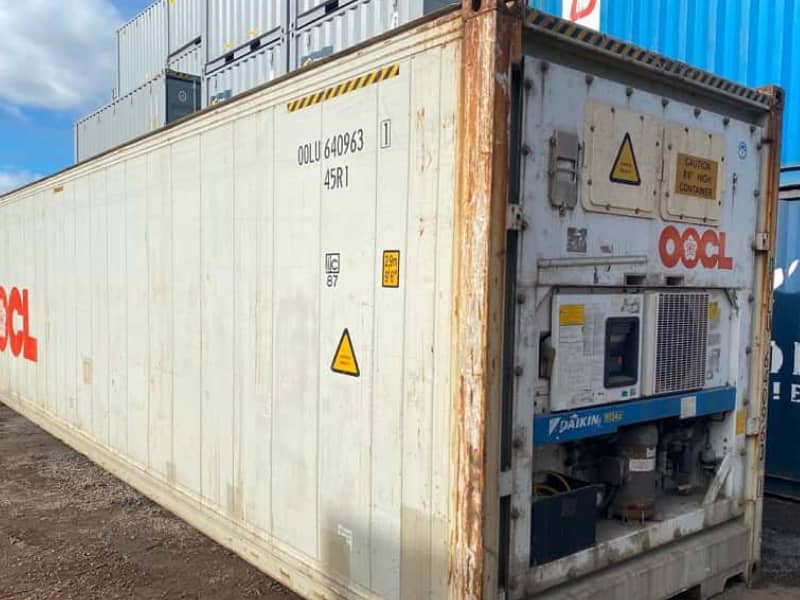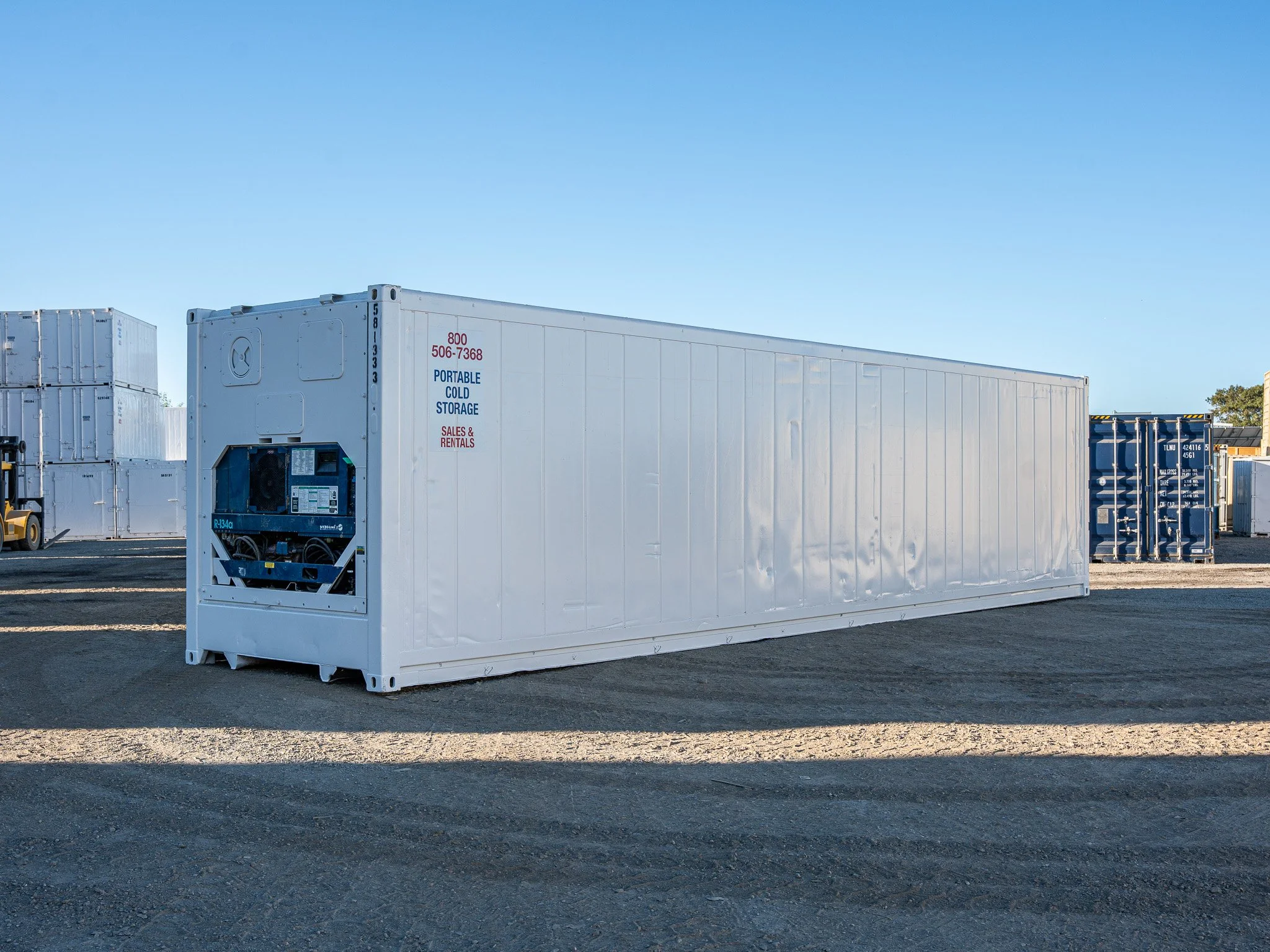Everything About Cold Store Containers: Vital Insights for Your Storage Needs
Cold store containers play a vital duty in the preservation of subject to spoiling products. They are available in different types, consisting of chilled and protected units, each made for particular storage space needs. Comprehending the advantages and key features of these containers is necessary for services intending to maximize their operations. As the demand for efficient storage space services grows, checking out the various options available can cause informed choices that influence both productivity and sustainability. What aspects should one take into consideration when choosing the ideal container?
Kinds Of Freezer Containers
Freezer containers been available in various types, each developed to satisfy certain temperature control requirements. Amongst the most usual kinds are chilled containers, which keep temperatures in between 0 ° C to 10 ° C, making them appropriate for perishable items like fruits, veggies, and milk products. One more kind is the deep freezer container, which operates at temperatures listed below -18 ° C, ideal for long-lasting storage space of frozen products such as meats and fish and shellfish.
Insulated containers give temperature level security without energetic air conditioning, making them beneficial for temporary transport of temperature-sensitive items. Furthermore, there are portable freezer units, which use flexibility in areas and are frequently made use of in occasions or seasonal procedures. Blast chillers rapidly minimize the temperature level of warm foods, guaranteeing safety and top quality. Each kind serves an unique function in various industries, from food service to drugs, emphasizing the significance of picking the best container for specific storage space needs.

Benefits of Making Use Of Cold Store Solutions

Cool storage space solutions prolong the rack life of things, decreasing waste and increasing productivity for organizations. By effectively taking care of supply with proper temperature control, companies can enhance their supply chains and improve operational performance.
Furthermore, chilly storage centers enable for versatile storage space alternatives, fitting different quantity needs and seasonal changes in demand (used 40ft refrigerated shipping containers). This versatility aids services respond quickly to market adjustments
Last but not least, employing cool storage options can assure conformity with health and wellness policies, safeguarding both organizations and consumers. Overall, the calculated usage of cold storage space enhances item monitoring while advertising sustainability and financial stability.
Trick Features to Search For in Cold Store Containers
When picking cold store containers, numerous crucial attributes merit careful factor to consider to safeguard peak performance and integrity. First, temperature level control capacities are crucial; containers must keep constant temperature levels suitable for particular goods. Insulation high quality additionally plays a significant duty, as superior insulation lowers energy intake and improves temperature level stability.
Next, ease of gain access to and loading is important; containers ought to offer straightforward layouts for effective handling and organization. Sturdiness is another vital element; weather-resistant materials ensure long life and protect contents against environmental elements.
In addition, mobility features, such as built-in wheels or lifting points, assist in transport, while personalized designs permit tailored storage space options.
Keeping an eye on systems, including temperature level alarm systems and remote monitoring, offer real-time updates, making specific that conditions stay excellent. By concentrating on these attributes, users can pick cool storage containers that satisfy their functional demands successfully.
Choosing the Right Cold Store Container for Your Requirements
Selecting the ideal cold store container needs a thoughtful assessment of operational demands and details requirements. Elements such as the kind of products being stored, temperature level of sensitivity, and quantity needs to be prioritized. For example, disposable food things might necessitate containers with rigid temperature level controls, while drugs may call for specific conditions to maintain effectiveness.
Additionally, potential users should take into consideration the container's size and movement. A bigger unit may be essential for bulk storage, while smaller, mobile choices could be optimal for on-site or temporary demands. Insulation high quality and power efficiency are also critical, as these will influence functional prices and temperature level security.
Last but not least, compliance with industry policies and standards is essential, particularly in markets like food and healthcare. By very carefully evaluating these aspects, customers can pick a freezer container that efficiently meets their unique requirements and guarantees optimal storage conditions.
Best Practices for Keeping Cold Store Issues
Preserving excellent freezer conditions is vital for protecting the high quality and security of temperature-sensitive items. Consistently monitoring temperature level and humidity degrees is important; using reputable electronic thermometers and hygrometers can supply accurate readings. Additionally, proper insulation of cold storage space containers assists reduce temperature level changes and power loss.
Carrying out a first-in, first-out (FIFO) system guarantees that older inventory is utilized before more recent supply, reducing waste (used 40ft refrigerated shipping containers). Additionally, keeping an organized format within the storage space permits for better air flow and minimizes the risk of cross-contamination
Regular upkeep checks on equipment, such as compressors and seals, are necessary to avoid malfunctions. Staff training on finest practices for packing and dumping products aids maintain temperature stability. Finally, keeping doors closed as high as feasible limitations heat exchange, ensuring that the freezer setting remains reliable and stable in maintaining useful products.
Price Factors To Consider for Cold Store Solutions
When examining cold store services, it is vital to take right into account the preliminary investment prices along with ongoing functional expenses. A thorough failure of these prices can reveal considerable long-term financial savings possibility for organizations. Comprehending these monetary facets assists stakeholders make informed choices concerning their freezer needs.

Initial Investment Prices
The financial landscape of cold store containers offers various first financial investment costs that organizations need to think about. These prices commonly consist of the purchase or rental price of the containers, which can vary based on insulation, kind, and size quality. Furthermore, expenditures connected to retrofitting existing frameworks to fit cool storage space needs to be factored in, specifically if specialized tools is get more info needed. Installment prices, including electrical work and refrigeration systems, additionally add to the total initial investment. Organizations need to not forget transport prices for providing containers to their desired location. Potential customization options, such as shelving or temperature level monitoring systems, can better influence the preliminary economic investment. Cautious budgeting for these factors is important for effective cold storage application.
Functional Costs Breakdown
Functional expenditures for cool storage remedies incorporate a number of essential cost factors to consider that services should navigate. Trick aspects consist of power expenses, which can be substantial due to the need to keep reduced temperature levels. Upkeep costs are likewise significant, as regular servicing is necessary to guarantee devices operates efficiently and stays compliant with wellness and safety and security criteria. Furthermore, labor costs might occur from the requirement for specialized staff to manage and check the storage space setting. Insurance coverage costs are another consideration, as business must secure their financial investments versus possible losses. Any prospective regulatory compliance costs must be factored in, as services may need to invest in systems that stick to food security and ecological guidelines. Comprehending these expenses is essential for efficient budgeting.
Long-Term Savings Potential
Spending in cold store solutions supplies significant lasting savings possibility, transforming first expenditures into financial effectiveness gradually. By decreasing perishing and waste, services can improve their profit margins considerably. Advanced insulation and energy-efficient systems reduce utility expenses, which accumulate over the life-span of the devices. Cool storage space containers commonly require less frequent maintenance contrasted to typical refrigeration approaches, leading to reduced repair expenses. The capability to shop products for extensive durations without compromising high quality permits organizations to maximize market variations, maximizing earnings. Additionally, the scalability of cold store options allows companies to adapt to transforming needs without incurring extreme prices. In general, these aspects add to a compelling case for cold storage as a cost-efficient investment strategy.
Regularly Asked Inquiries
How Lengthy Can Food Be Saved in Cold Store Containers?
The duration food can be kept in freezer containers differs by type. Typically, disposable things last from days to weeks, while frozen foods can remain risk-free for months, depending upon appropriate temperature and storage conditions.
Are Freezer Containers Energy-Efficient?
The power efficiency of chilly storage containers differs based upon layout and insulation top quality. Modern devices typically use sophisticated technology to reduce power usage, eventually adding to reduced operational expenses and environmental influence in long-term usage.
Can Freezer Containers Be Custom-made for Details Requirements?
Cold storage space containers can certainly be customized to satisfy specific demands. Modifications might consist of temperature controls, size adjustments, and added functions, allowing individuals to tailor solutions effectively for numerous storage space demands and functional choices.
What Are the Usual Sizes of Cold Store Containers?
Freezer containers commonly can be found in typical dimensions such as 10, 20, and 40 feet. These measurements fit various storage space requirements, making certain flexibility for organizations needing temperature-controlled atmospheres for subject to spoiling goods or sensitive products.
Do Cold Store Containers Require Unique Licenses for Use?
Cold storage space containers frequently require special permits for usage, depending upon neighborhood guidelines and planned applications. Authorities might mandate authorizations to ensure safety standards, environmental compliance, and proper operational practices are kept during their usage.
Cold storage containers come in various types, each created to meet details temperature level control requirements. Additionally, cold storage facilities enable for flexible storage space choices, accommodating numerous volume demands and seasonal changes in need. Picking the right cold storage space container requires a thoughtful evaluation of details requirements and operational needs. The monetary landscape of cool storage containers provides various initial financial investment prices that companies should take into consideration. Cold storage space containers can undoubtedly be customized to satisfy particular needs.